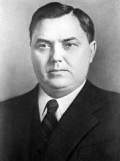 |
Georgy Maksimilianovich Malenkov
b. 26 Dec 1901 [8 Jan 1902], Orenburg, Russian Empire
d. 14 Jan 1988, near Moscow, USSR |
| Title: |
Председатель Совета Министров СССР (Chairman of the Council of Ministers of the USSR) |
| Term: |
5 Mar 1953 - 8 Feb 1955 |
| Chronology: |
5 Mar 1953, appointed, joint resolution of the CPSU Central Committee, Council of Ministers of the USSR and Presidium of the USSR Supreme Soviet [1] |
|
31 Jan 1955, resignation submitted to and accepted by the CPSU Central Committee [2] |
|
8 Feb 1955, discharged, resolution passed by the 2nd session of the 4th USSR Supreme Soviet [3] |
| Biography: |
Conscripted into the Red Army (1919); joined the Russian Communist Party (1920); employed by the party Central Committee chancellery in 1925 and rose to a department head in the Moscow city party committee (1930); working as head of the party executive bodies department in 1934-1939, became closely associated with Iosif Stalin and the secret police chief Lavrenty Berija; was deeply involved in the great party purge of the late 1930s; elected full member of the Central Committee (1939-1957), member of the Orgburo (22 Mar 1939 - 5 Oct 1952) and secretary of the Central Committee (22 Mar 1939 - 6 May 1946); elected candidate member of the Politburo (21 Feb 1941 - 18 Mar 1946), attained full membership (18 Mar 1946 - 5 Oct 1952); headed the Cadres Department of the Central Committee (Mar 1939 - May 1946); during the Second World War II served on the State Defense Committee (30 Jun 1941 - 4 Sep 1945); was made deputy chairman of the USSR Council of People's Commissars (15 May 1944 - 15 Mar 1946); involved in a rivalry with Andrej Ždanov; was relieved of duties of the Central Committee secretary (6 May 1946) and appointed chairman of the Special Committee for Rockets (13 May 1946 - May 1947); appointed deputy chairman of the USSR Council of Ministers (2 Aug 1946 - 5 Mar 1953); returned to the party leadership and again was approved the Central Committee secretary (1 Jul 1948 - 14 Mar 1953); after the 19th party congress was elected a full member of the Central Committee's Presidium (16 Oct 1952 - 29 Jun 1957) and a member of unoffical Buro; was ween by many as Stalin's successor; with the support of Berija secured appointment as Chairman of the USSR Council of Ministers (5 Mar 1953 - 8 Feb 1955) on the eve of Stalin's demise; resigned his position in the Secretariat (14 Mar 1953) and focused on management of the government affairs; supported an economic program targeted at increasing the production of consumer goods at the expense of heavy industry; was criticized at the Central Committee plenum (25 Jan 1955 - 31 Jan 1955) for ties with the executed "people's enemy" Berija and for inability to implement party policies; dismissed from his position as head of the Soviet government; was seconded to the deputy Chairman of the USSR Council of Ministers (9 Feb 1955 - 29 Jun 1957) and power stations minister (9 Feb 1955 - 29 Jun 1957); supported the anti-party group plotting against Nikita Hruščëv; was dismissed from all party and state offices and was made manager of the Ust-Kamenogorsk hydroelectric plant and later director of the Ekibastuz heating station in Kazakhstan; expelled from the Communist Party in November 1961; retired in late 1961; died in obscurity 27 years later. Biography source: [4] |
|
|
| |
| [1] |
Ведомости Верховного Совета СССР, 1953, № 2. |
| [2] |
ЦХСД, ф. 2, оп. 1, д. 127. |
| [3] |
Ведомости Верховного Совета СССР, 1955, № 2, Ст. 47. |
| [4] |
Государственная власть СССР. Высшие органы власти и управления и их руководители. 1923-1991 гг. Историко-биографический справочник / Сост. В.И.Ивкин. М.: РОССПЭН, 1999, |

